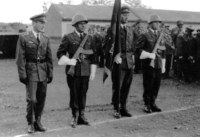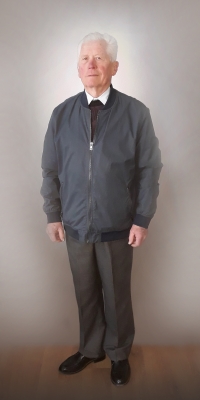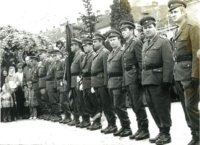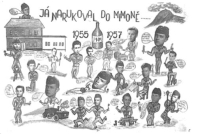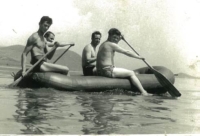“There was a Jewish family and another one in the other village. They had quite large possessions, lands, and businesses; they were very into business. They were working hard and running their own business. Already at that time, there were guardsmen when that disaster came to the Jews and began to destroy them. There were two Jewish girls, their brother (Šlojma was his name), and their parents. The guardsmen took the grandparents from several families and gathered them in the church in Giraltovce. I was leaving the mill. We had been grinding wheat with my mum there, and another lady was with us. And those guardsmen gathered those people along the fence. They would sort the Jews there: the parents on one side, the children on another, and the elderly people on another side. The lady told us, ‘Look what they are doing to the Jews. Where are they going to take them?’ She was a simple village lady, she did not know anything about politics, but she felt sorry for the Jews and for what was happening to them, so she had this kind of remark. The guardsmen were about 30 to 36 years old, and they said, ‘What have you just said, ma’am? That you feel sorry for those people? There is enough space for you as well. You can go with them!’ In this context I would like to mention that one of our neighbours, who lived four or five houses down from our house, his name was Mašlej. He took two Jewish girls into the forest and told them to stay there, because the guardsmen were taking the Jews away. The place was called Červená skala. He told the girls, ‘I will help you. I will save you, just wait here. You can wash your clothes down there near the river’. There was a tiny stream, I exactly remember that place. In the afternoon that neighbour took the Germans there, they had machine guns, and he showed them where the two girls were hidden. The German officers took them away. I do not know what happened to them… But their brother came back. I do not remember exactly how it happened, but after the war, sometime in 1945, I was sitting near that stream as a boy. I was nine years old. I was looking around, everything was silent, and suddenly from the right side there was a soldier coming. He was tall and handsome. I already knew that the uniform was neither Russian nor ours: it was American. He had a peaked cap and walked slowly upwards. I knew him. He only asked me, ‘Mayor?’ And he went straight to the mayor, who ran away. I do not know how he found out. The mayor’s wife stayed at home, so he was asking her where the girls were, where his sisters were. He started to cry. He told them, ‘You know what? If someone had saved my sisters… that person and his family would not have to work until the end of their lives. I have so much money in America.’ And he left the village in tears.”

